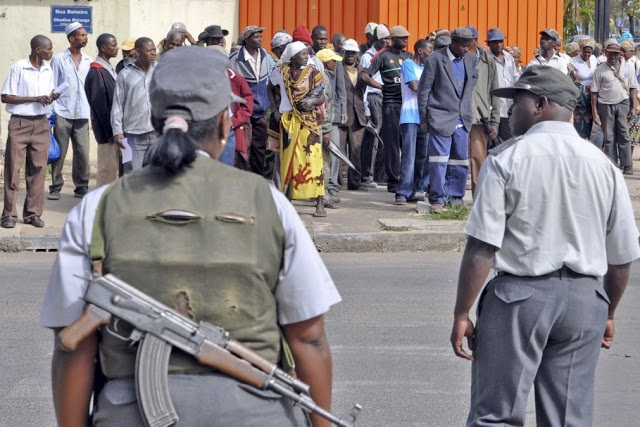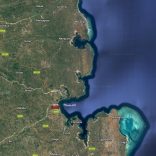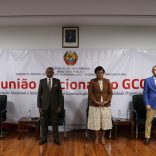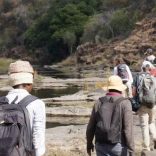Mozambique: In Nampula province, 18% of girls marry before 15, 56% before 18 — UNICEF
Mozambique: Activists accuse police of ‘brutality, intimidation’ against peaceful protests

FILE - Illustrative photo. [File photo: Lusa]
Mozambican lawyers and human rights activists on Wednesday accused the police of “brutality and intimidation” against peaceful demonstrations, pointing out that the right to demonstrate only requires “notice or communication” to the authorities and not authorisation.
The Mozambican authorities’ actions were the subject of debate today at a conference on “The Right to demonstrate” promoted by the Mozambican Network of Human Rights Defenders (RMDDH).
João Nhamposa, lawyer and human rights specialist, accused the police of acting with “brutality” against peaceful and legal demonstrations, violating fundamental rights.
“What we have seen is the police acting with brutality and impunity against the right to demonstrate,” he said, since “the Constitution of the Republic clearly states that the police must protect the exercise of fundamental rights”.
He pointed out that the law expressly says that the right to demonstrate requires only a notice or communication to the authorities, four days in advance, and does not require authorisation.
“The group of citizens that intends to organise a march, protest parade or gathering in a public place in legitimate protest must only communicate the time of the beginning and end of the act, as well as the itinerary, to ensure that the police guarantee respect for law and order and never for the intimidation of protesters,” he said.
Under Mozambican law, he went on, a protest can only be banned if it violates the constitution, ordinary legislation, morals, good customs, fundamental rights and the rights of collective persons.
“If the authority understands that there is a violation of the law in the purpose of the demonstration, it must communicate the decision to ban it within two days, and the march can go ahead if the authorities are silent,” he stressed.
João Nhampossa accused the Government, the police and judicial institutions of encouraging abuses by police officers, due to the lack of accountability of offenders.
“There is a culture of impunity encouraged by the country’s leadership and there is also a culture of lack of accountability both by the judiciary and by citizens themselves, who do not initiate measures to respect their fundamental rights,” he added.
O advogado João Nhampossa, painelista no #webinar sobre o #Direito à #Manifestação, deixou claro que :
“O direito à #liberdade de manifestação não carece de nenhuma autorização de qualquer autoridade policial ou civil. pic.twitter.com/RIMT7z93ae— RMDDH (@RMDDH_Moz) June 3, 2021
Esmeraldo Matavel, a judicial magistrate, also argued that the law is clear regarding the protection and encouragement of legal demonstrations because they constitute a form of “civic participation in the conduct of the country’s destinies.”
“The police must be trained in human rights, to respect the exercise of fundamental freedoms, because these are backed by the constitution and the law,” Esmeraldo Matavel stressed.
He pointed to recourse to the courts as a way for citizens to see their right to demonstrate respected in the event of refusal or violation by the authorities.
“In these cases, the courts do not act ex officio [on their own initiative], they act when they are ‘provoked’ by those who have the legitimacy to initiate an action,” Matavel said.
Adão João Paia, a social activist, advocated for police training in human rights aimed at discouraging repression against the exercise of fundamental rights and freedoms.
“Repression should have no place in a democratic rule of law, because the country has adopted these principles and they must be respected,” Paia said.
On 11 May, a university student was held in police custody in Maputo for several hours for taking part in a demonstration that police dispersed.
The protest was against a draft law approving benefits for employees of parliament.
The demonstration was joined by about 30 students who responded to a call on social networks for a protest in the centre of the capital.
In another case, considering that the right to demonstrate is under threat in Mozambique, the RMDDH accused the police of having “prevented, for a moment, on 23 May, the walk of Mozambican citizens organised in solidarity with displaced people in Cabo Delgado and with the Palestinian people victim of Israeli attacks,” a walk that later took place.
“A #RMDDH é o mecanismo que visa proteger os defensores, promover a #segurança dos defensores e fundamentalmente lutar para que os #defensores possam continuar a realizar os seus trabalhos”. @adriano_nuvunga pic.twitter.com/IU0CPTQ0uR
— RMDDH (@RMDDH_Moz) June 3, 2021












Leave a Reply
Be the First to Comment!
You must be logged in to post a comment.
You must be logged in to post a comment.